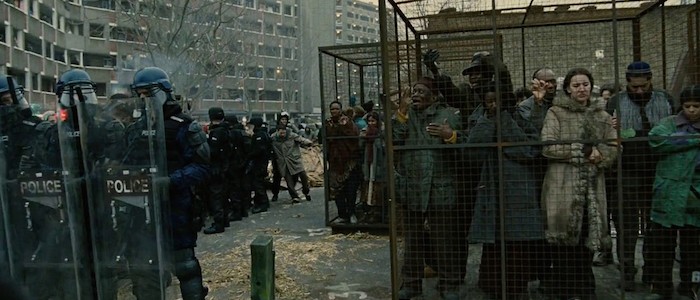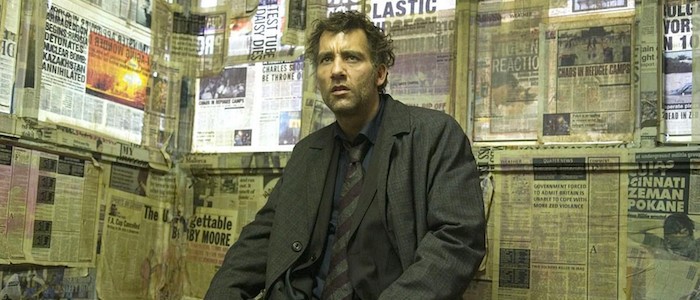If You Still Want A Sequel To 'Children Of Men,' Read 'The Children Of Men'
The end of Alfonso Cuarón's Children of Men, with its mournful hope like a cinematic gasp for breath, filled me with two conflicting thoughts when I first saw it. The first, that it absolutely needed a sequel. The second, that no one should ever, ever, ever make a sequel.
We watched Theo Faron (Clive Owen) on his journey through bone-deep apathy to redemptive idealism, but we also watched the world around him, trying to understand how the possibility of a pregnancy could affect an infertile future. The movie was an arrow that never came down, so I wanted to follow it further. But making a sequel would be like playing baseball with a big, already perfect pearl.
So what do you do with a perfect package that also cries out for an extended story? Go to the source material.
A Very Different Experience
Children of Men may be the only movie to present a workable solution to this rare sequel conundrum because it maintains the sci-fi conceit and the main plot driver of the book it's based on but throws away nearly everything else. What you're afforded because of that is another journey into the dystopian England of the 2020s, another journey with Theo, that feels like a completely different story set in the same universe. Every 30 pages or so, something familiar pops up – the Quietus, the Fishes, the Omegas – and you get to see how Cuarón and company altered it to fit their vision. Familiar enough to act as a sequel; different enough to offer a fresh experience.
Yes, I understand the irony and potential blasphemy of using the source material as a "follow-up" to the movie it birthed. However, if you haven't read it (as I hadn't until a few months ago), it's waiting there like buried treasure waiting to be discovered, and because the novel and the movie are so different, the book isn't ruined one iota by the imagery already in your mind. Plus, the book is ingenious, and its impact highlights the strengths of the medium's ability to better deliver a complete, intimate portrait of its main character, defining Theo not only through his visible actions, but by his innermost desires and phantasmagorical pain.
When P.D. James published "The Children of Men" in 1992, it was a departure. She'd made her name as an author of taut murder mysteries, and that pedigree served her well in crafting a dark vision without children's voices. The pacing echoes a thrilling hunt, but instead of unearthing a killer, the novel borrows the parable of endurance offered by Jesus Christ's suffering, putting Theo through the ringer like Dante strolling further into hell to escape it. The Christian religious imagery stuck around for the film (which came out on Christmas Day), joined by Jasper's (Michael Caine) grab bag of hippy beliefs and the Hindu-evoking "Shantih Shantih Shantih" of the closing credits. Unlike the book, the movie tackles the question of loving thy neighbor by insisting that Kee (Clare-Hope Ashitey), the black refugee carrying the world's first baby in years, is our neighbor no matter how many thousands of miles away her home is.
What's astonishing is how thoroughly Baroness James realizes her future. Her language is rich and sensory, plunging us immediately into the sunny muck of the world and sinking us even deeper in ways that may force you put the book down for a quick, wide-eyed break. She was brutal. The Children of Men achieves phenomenal depth by being honest about the soul-crushing strength of horrors that can befall all of us as proof of how strong hope can be in response. In her book, hope becomes an act of defiance.
The End of the World
To go through all the differences between the novel and the film would defeat the point and ruin the experience of using the novel as an in-spirit sequel. No spoilers here. Suffice it to say that the novel gives us a microscopic look into Theo's soul with a tragicomic childhood and early marriage/fatherhood, as well as frequent dips into his personal diary.
The barbed wire of Ingsoc transplanted from Orwell's mind into the film is nowhere to be found in the book. The novel is calmly desolate, exploring Theo's (and the world's) faith and his estranged relationship with Xan Lyppiatt, his cousin who is now the benevolent(?) dictator of England.
Subverting a century of world-ending dystopian stories, Baroness James' obliterated society isn't really all that bad, at least on the surface. Theo is haunted far more by the pre-infertility past than he is the present. Instead of being the grumbling office drone portrayed by Clive Owen, he's a University professor in a world without young students. Like the verse that inspired the title of the book, "Thou turnest man to destruction; and sayest, Return, ye children of men," Book Theo is content, but hungry for something to turn him back toward optimism, away from life's end.
In a week where civilization's destruction is in full force at the box office – with The Mummy and its antique villain, and It Comes at Night and its unknowable threat bearing down on the world – it's a great moment to revisit this unique version of the apocalypse that's made for an outstanding book and movie. If you've already read James' novel, you know how astonishing and exceptional it is, and if you haven't, you have a device to further your personal dive into the waters of Children of Men – to experience the joy of a sequel without the original-sullying threat of sequelitis – waiting for you at the library.


